02 Jul 2025
10 MIN READ
Will the Western Balkans Ever Join the EU? The Future of Europe’s Enlargement Policy
Summary
For over two decades, the Western Balkans, comprising countries like Albania, Bosnia and Herzegovina, Kosovo, Montenegro, North Macedonia, and Serbia, have been seeking EU membership. Despite major reforms and EU financial support, accession still feels distant. Internal dysfunction, EU fatigue, and global shifts are stalling progress, while Ukraine and Moldova have jumped ahead in the queue, leaving the Balkans questioning their future in Europe.
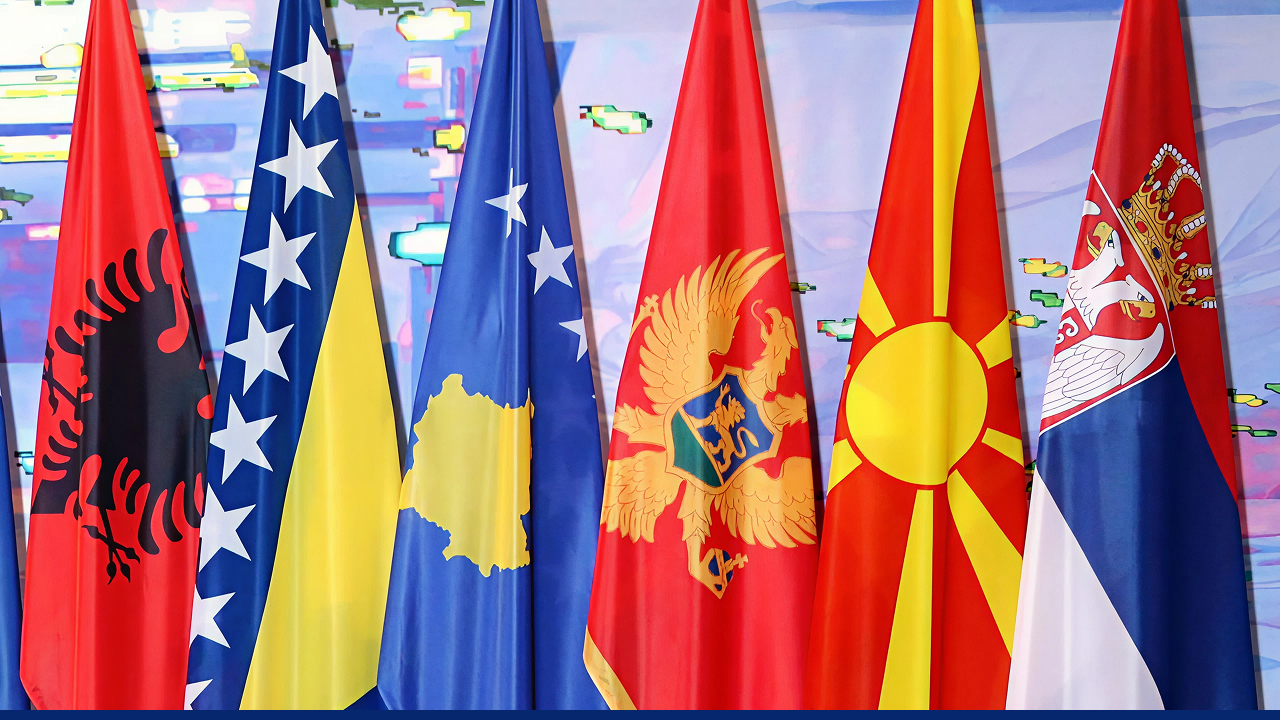
Flags of Albania, Bosnia, Kosovo, Montenegro, North Macedonia, and Serbia. Credits: Euractiv
Why the Western Balkans Matter?
Geographic and strategic importance of the Western Balkans?
The Western Balkans are situated at the heart of Southeastern Europe, surrounded by EU member states, including Croatia, Hungary, and Greece. This makes the region key to the EU’s long-term stability. The United States and the EU have invested dearly in the region to promote security and integration, but the progress has been slow, mainly due to corruption.
Even China is filling the vacuum without demanding reforms by offering rapid infrastructure financing through the Belt and Road Initiative. Using a hub-and-spoke strategy centered on Serbia, China is boosting its influence while exploiting EU divisions. Its economic presence challenges Western norms, with long-term risks to democratic standards and regional Euro-Atlantic alignment.
The Western Balkans, once part of Yugoslavia, has a combined population of around 18 million. The Balkans offer a sizable market and workforce, along with key transportation and energy corridors that connect Europe to Asia and the Middle East.
The role in the EU’s border security, energy, migration, and geopolitics
The region plays a critical role in border control, especially in the context of irregular migration flows. The so-called “Balkan Route” remains one of the most-used paths for asylum seekers entering Europe. Furthermore, energy diversification efforts, especially via gas and electricity interconnectors, depend on Balkan cooperation.
Geopolitically, the region is a contest for influence, with Russia, China, and Turkey all actively competing for influence. Gulf states have also gained influence in parts of the region, particularly in Muslim-majority areas of Bosnia. It is in the US’s favor that the Balkans are in the EU’s orbit, which is thus both a strategic and a security imperative.
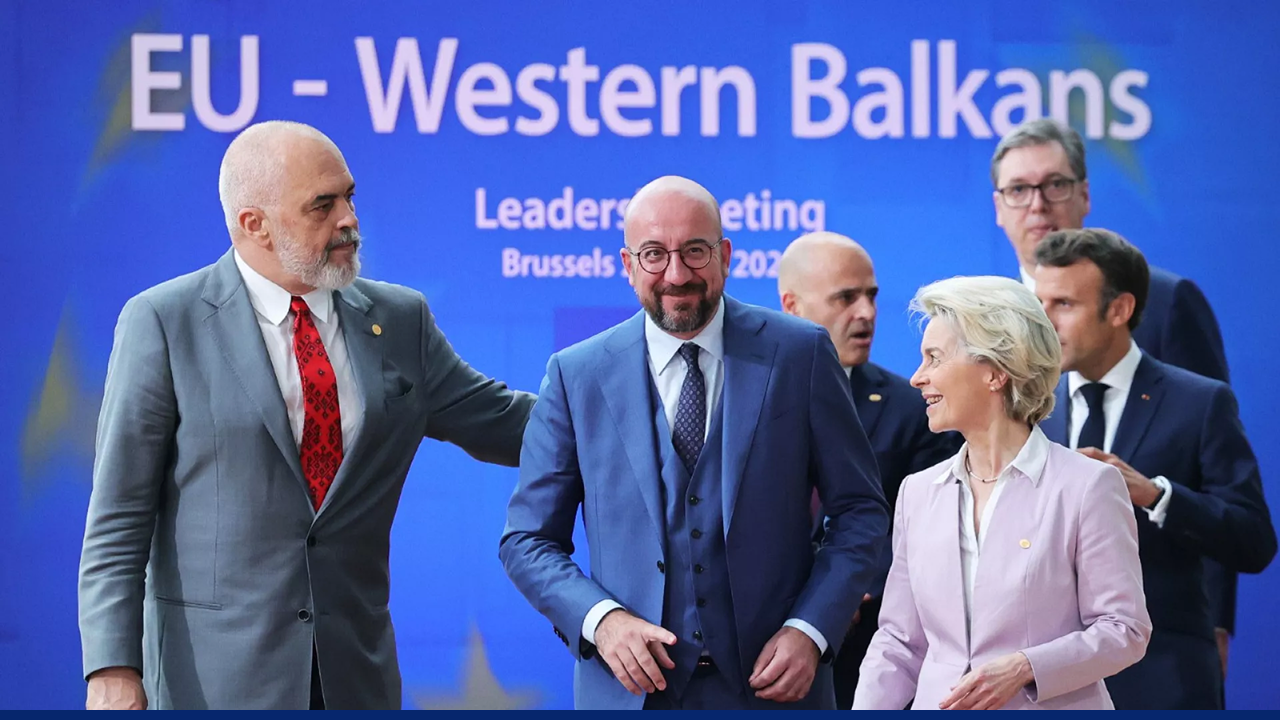
Albanian Prime Minister Edi Rama, European Council President Charles Michel, and European Commission President Ursula von der Leyen. Credits: Euronews
The Legal and Institutional Framework for EU Expansion
Article 49 TEU and the Copenhagen criteria
According to Article 49 of the Treaty on European Union, any European state that respects democratic values and is committed to promoting them may apply for EU membership. In practice, this is governed by the 1993 Copenhagen criteria, which require stable institutions guaranteeing democracy, the rule of law, human rights, and a functioning market economy.
Conditionality and reform benchmarks
The EU has linked accession to a strict system of conditions. Countries must implement reforms in judicial independence, public administration, media freedom, and anti-corruption measures. These goals ensure candidates reflect the values of the EU before joining. However, this process can feel like a moving goalpost for some of these countries.
Objectives vs. Ground Realities for the European Western Balkans
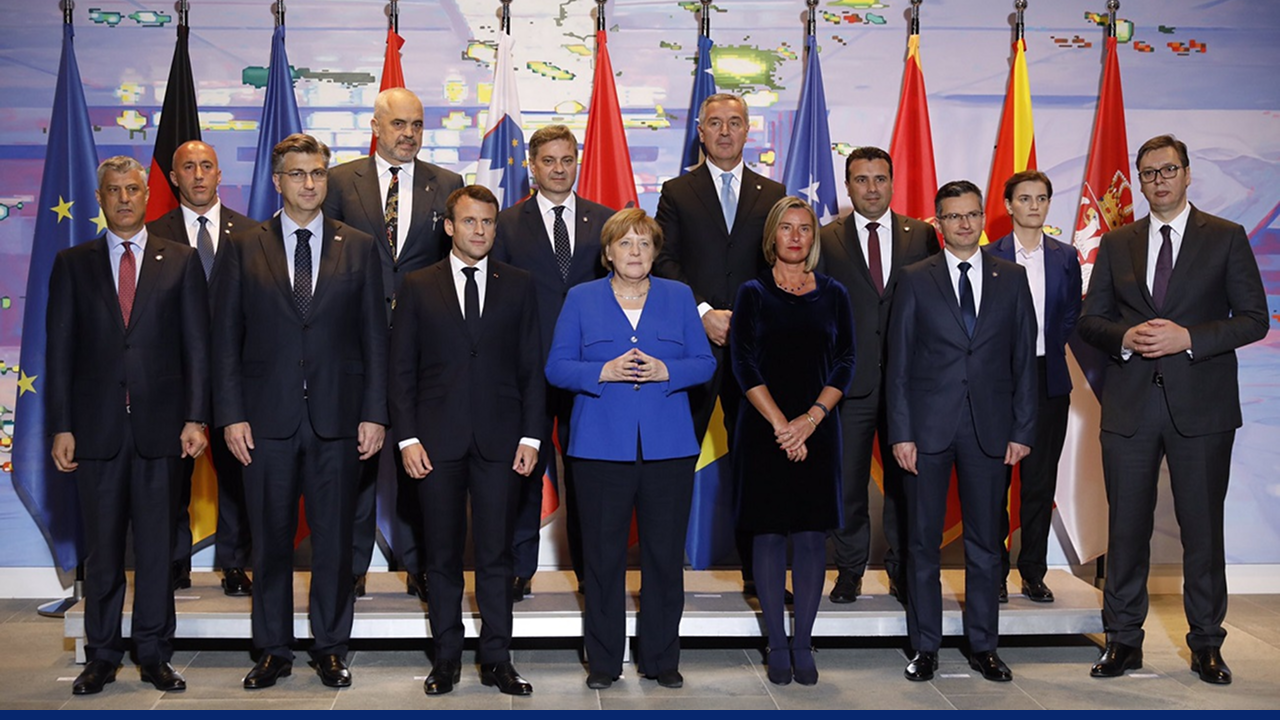
European Union and Western Balkans leaders pose for a group photo during the EU summit. Credits: Tanjug/Marina Maksimović
Official EU goals for the region
The EU’s objective for the region is to fully integrate the Western Balkans. This is to ensure long-term peace and stability in a region scarred by war in the 1990s. Brussels has repeatedly reaffirmed this goal, most notably at the 2003 Thessaloniki Summit and again in the 2020 Zagreb Declaration. Enlargement is framed as a strategic investment in Europe’s security and prosperity.
On-the-ground political, economic, and institutional obstacles
Despite formal commitments, the region remains plagued by political polarization, weak institutions, and widespread corruption. Rule-of-law issues, state capture, and deep ethnic divisions hinder progress, especially in Bosnia and Kosovo.
Economic development is lagging, with average GDP per capita in the region far below the EU average. While some reforms have been implemented, democratic backsliding and authoritarian tendencies persist, particularly in Serbia.
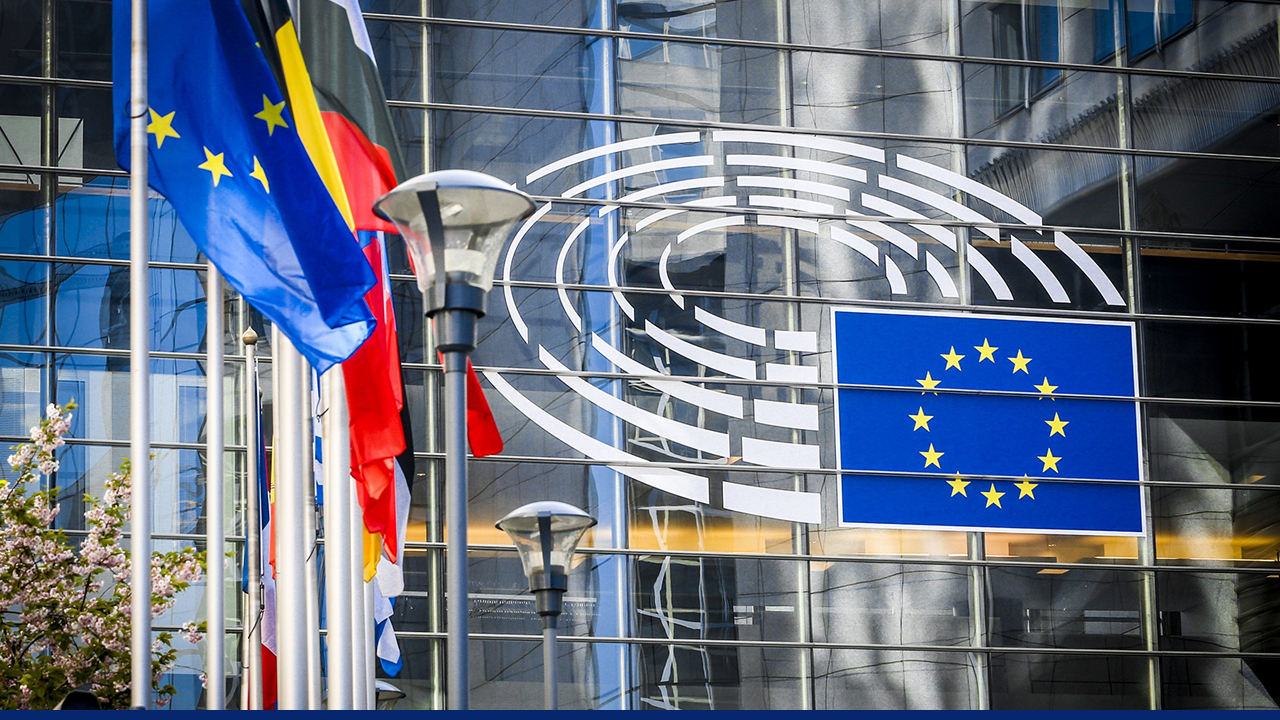
European Parliament building in Brussels with EU and member state flags. Source: Euractiv
What is slowing EU Expansion towards the Western Balkans?
Supply-side: Problems within the EU
Enlargement fatigue is a concern for the EU. Internal divisions, economic problems, and the rise of populist parties have led many member states to prioritize internal stability over expansion.
France and the Netherlands, in particular, have called for stricter accession rules and suggested that institutional reform within the EU must precede further enlargement. They both often veto new members. The EU’s consensus-based decision-making makes it easy for a single member state to stall or veto progress, as seen with Bulgaria’s block on North Macedonia.
There is also concern that some EU members are backsliding on their reforms after joining the EU. Some examples are Hungary, Slovakia, Bulgaria, and Poland. A few wonder if new members are accepted; this could be their fate in a few years.
Demand-side: Challenges within the Western Balkans
In the Balkans, reforms are often promising on paper but fail in practice. Clientelism, state capture, and weak judicial independence undermine EU conditions. Leaders use nationalist rhetoric to distract from stagnation and dodge fundamental reforms. These issues create a cycle: As EU skepticism rises, Balkan societies feel less motivated to reform.
Ukraine and Moldova: Will This Be an EU Paradigm Shift?
Fast-tracking to post-2022
Russia’s invasion of Ukraine fundamentally shifted EU strategic thinking. Within months, Ukraine and Moldova were granted candidate status, and Georgia was recognized as a potential member. This political momentum has raised hopes and frustrations in the Western Balkans. Many Balkan members felt left out and abandoned.
Frustration in the Balkans
The fast-tracking of Ukraine and Moldova has caused deep frustration among Balkan leaders and citizens. Many feel that years of fulfilling EU requirements have yielded little reward, while geopolitical urgency has opened doors for others. This perceived inconsistency threatens to discredit the EU’s credibility and legitimacy in the region. However, the fast-tracking of Ukraine and Moldova is heavily exaggerated as they both also have major obstacles and won’t be in the EU in the immediate future. They still have to adhere to the criteria as every other member.
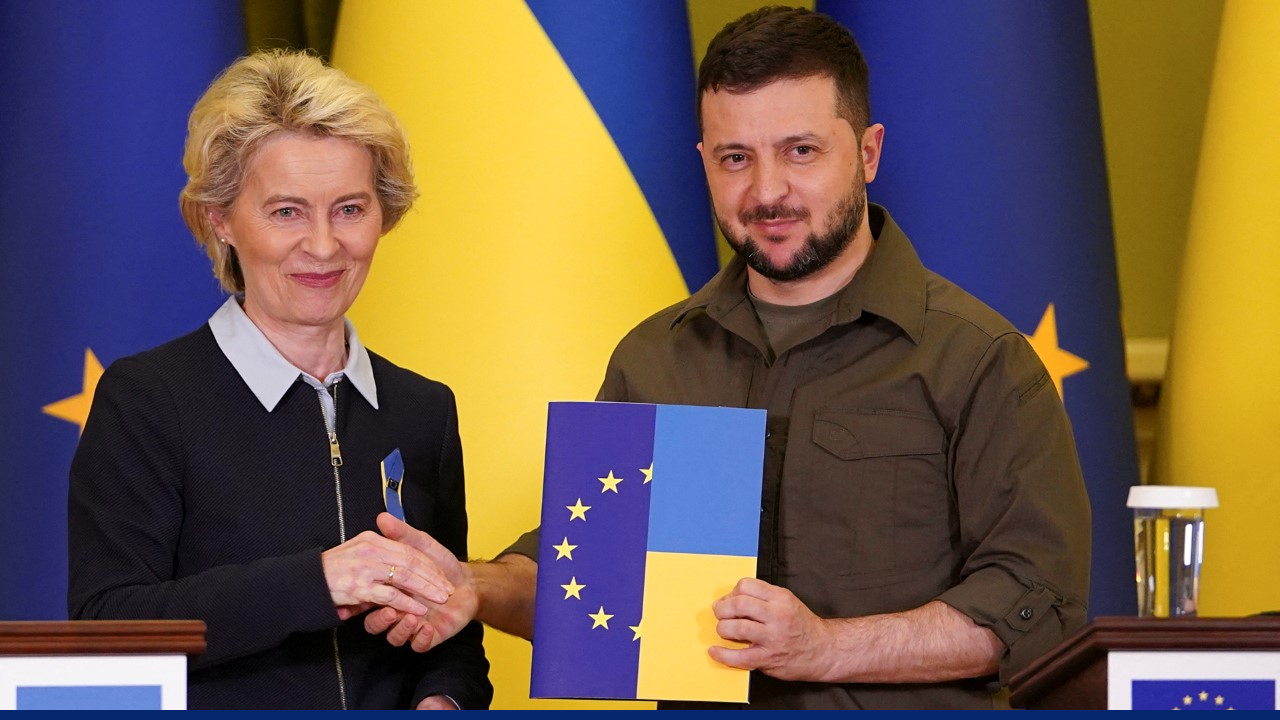
Ukrainian President Volodymyr Zelenskyy (R) and EU Commission President Ursula von der Leyen (L) attend a joint press conference in Kyiv, Ukraine. Credits: ISPI
Where Western Balkan States Stand on the Road to the EU
Montenegro
Montenegro is considered a good student or the frontrunner. Montenegro has opened all accession chapters, but has seen stagnation in recent years due to political instability and corruption. The EU remains concerned about organized crime and the independence of the judiciary, but it has recently been commended and is on a positive trajectory.
Serbia
Serbia balances between EU accession and close ties with Russia and China. While formal negotiations continue, Belgrade’s refusal to recognize Kosovo and increasing authoritarianism under President Vučić pose serious obstacles. The citizens are politically polarized on which geopolitical direction they want to follow.
North Macedonia & Albania
North Macedonia made painful concessions, including renaming the country, to resolve a dispute with Greece; however, Bulgaria blocked the agreement due to cultural and historical reasons. They recently elected a right-wing president who wants to undo those concessions. Albania, though making progress on judicial reforms, faces similar delays due to the EU’s internal divisions.
Kosovo & Bosnia
Kosovo remains unrecognized by five EU member states, which complicates its path to EU accession. Many EU countries don’t recognize Kosovo because it would set a precedent in their own countries regarding separatism. For example, if Spain were to recognize Kosovo, it would give an incentive for the Catalans and the Basques to seek separation.
Bosnia and Herzegovina, which is deeply divided along ethnic lines, struggles with fundamental state functionality. Bosnia’s complex tripartite governance structure divides power among Bosniaks, Croats, and Serbs, creating inefficiencies and political deadlock. Despite its 2022 candidate status, meaningful progress remains unlikely in the near future.
What comes next for the Western Balkan region?
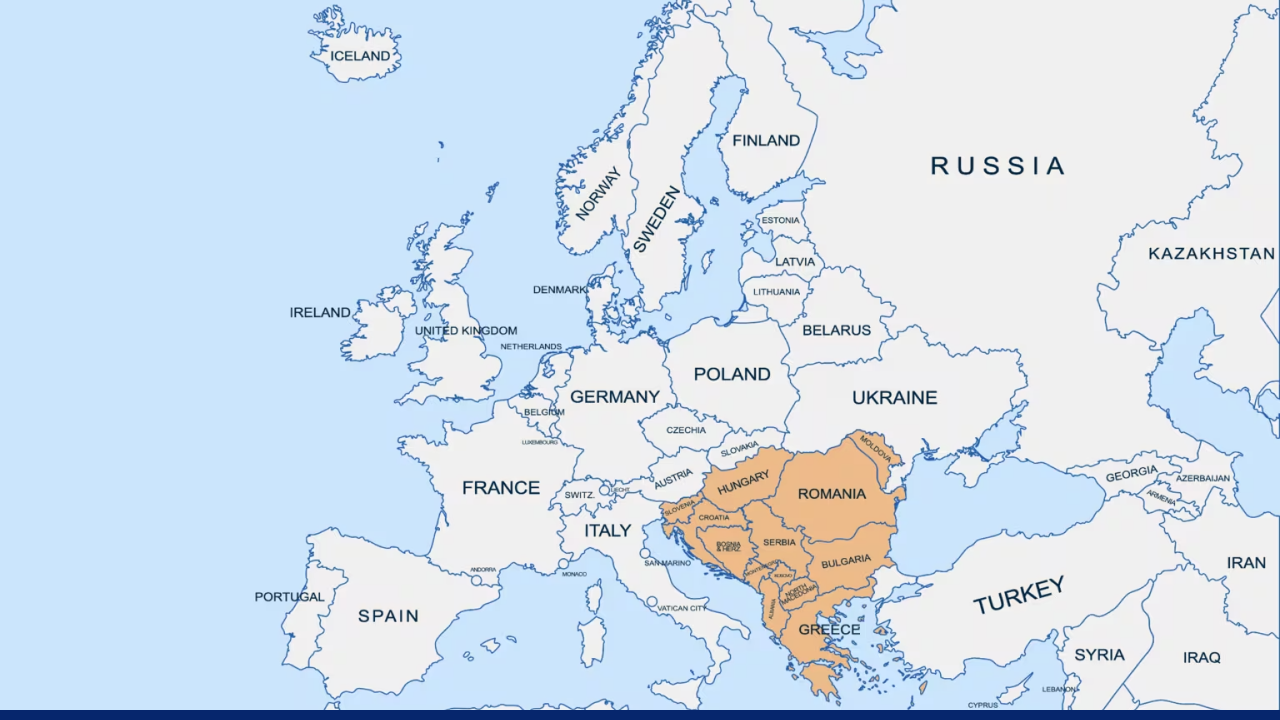
The Western Balkans and Southeast Europe region is highlighted in orange, including countries such as Romania, Serbia, Albania, and Greece. Credits: Mappr
Possible enlargement scenarios for the Western Balkans
Several paths exist for the Western Balkans. One option is gradual integration, which could begin with access to EU programs and funding before full membership. Another idea is a tiered EU structure, in which Balkan countries would join a looser political community first. A more pessimistic view suggests the EU will keep the status quo due to concerns over weak rule of law, corruption, state capture, and democratic backsliding in several Western Balkan countries.
Will 2030 be a realistic target for EU enlargement?
European Council President Charles Michel's proposal of 2030 as a target for EU enlargement is ambitious but not very realistic across the Western Balkans. While Montenegro, having opened all accession chapters, could meet the timeline with sustained reforms, other countries face deeper challenges. Serbia’s stance on Kosovo, Bosnia’s internal divisions, and Kosovo’s limited recognition remain major obstacles.
Moreover, EU member states are cautious due to governance concerns, enlargement fatigue, and geopolitical tensions. Unless both the EU and candidate countries accelerate reforms and rebuild mutual trust, 2030 risks becoming more symbolic than actionable, echoing past missed deadlines and eroding regional confidence. Without a strong commitment, this date might become just another empty promise.
Conclusion
The Western Balkans are Europe’s unfinished business. Bringing the region into the EU is not just a moral obligation, but a strategic necessity for the sake of stability, security, and the integrity of the European project. Yet success requires clarity, consistency, and courage from both Brussels and Balkan capitals. The EU must renew its commitment, end the cycle of vague promises, and provide a credible and achievable path forward.
People Also Ask
Is Serbia ever going to join the EU?
Serbia remains a candidate for EU membership, but its slow pace of reforms and strained relations with Kosovo are hindering its progress. Accession is possible, but far from guaranteed.
Which country is most likely to join the EU next?
Montenegro has made the most progress so far.
Is Albania trying to join the EU?
Yes, Albania is actively pursuing EU membership and has officially started accession negotiations. Progress depends on continued reforms and alignment with EU standards.
What is the EU strategy for the Western Balkans?
The EU strategy for the Western Balkans, known as the "Growth Plan," aims to integrate these countries into the EU's single market, boost economic growth, and accelerate their socio-economic convergence with the EU.
Can non-European countries join the EU?
No, Morocco's 1987 EU membership application was rejected because it is not a European country, establishing a precedent.
